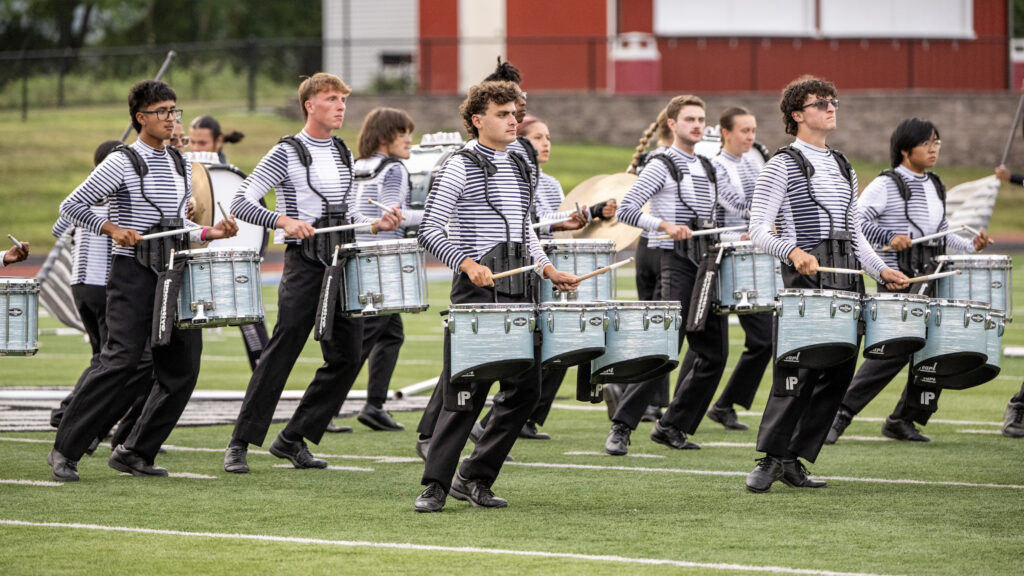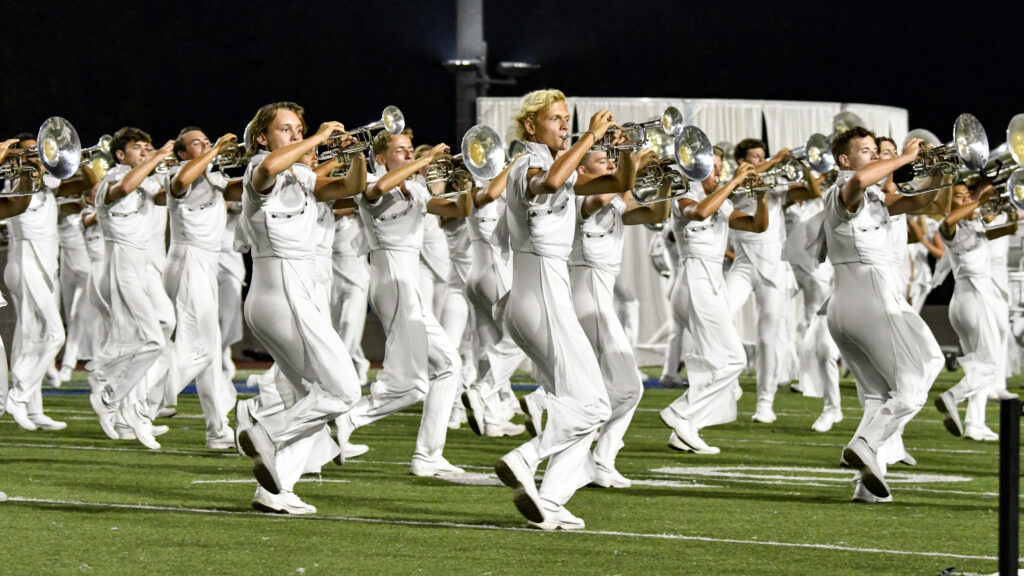
First he drops me an e-mail when I’m in San Diego for the WGI World Championships, asking me to write about guards … and, oh, it has to be done by morning. (Hey, sleep is highly overrated, especially the night after you fly cross-country.) Then he asked me to write about percussion front ensembles and then judges on similar time schedules.^ Fine. I obviously am aware of guards or else I wouldn’t have been in San Diego. I used to march mallets prior to the advent of the front ensemble, so that one wasn’t much of a stretch. And I once took judges’ training before realizing I had nothing to contribute to the world of judging. That last column prompted Gene Monterestelli, DCI judge extraordinaire, to call me and state that I’m the only person he’s ever seen who publicly admitted that he couldn’t do a better job judging than the judges on the field and in the stands. Actually, Gene primarily called to give me info on some writeups I’m supposed to be doing on early DCI Hall of Fame members, but I’m hoping Dave forgets about that one. So, anyhow, Dave now feels all he has to do is throw out a topic and I can write something pithy and meaningful about it, which is why he’s just asked me to write about drum majors. (To tell the truth, Dave gave me a few days warning on this one. I just elected to ignore it until the night before it was due, taking a chance that he might be kidnapped by space aliens prior to the due date…and then I’d be off the hook.) The fact that I’ve never paid attention to drum majors is part of the reason I’ve allegedly been writing a column about drum majors thus far and have only now mentioned that the column is about drum majors. (Don’t try to diagram the previous sentence and no one will get hurt.) That is, unless you count the title, which in this case, is probably one of my more accurate titles on a Fanfare column, or at least the mid-week version. It may well be just a “few” thoughts on drum majors. But I can’t stall forever. Hey, if you’re going to be at the big DCI shows in DeKalb, Kalamazoo, Orlando, Allentown, Indianapolis, Denver or the Tour of Champions in California, feel free to look me up, especially if you want to buy lunch. Having attended college in DeKalb, I know where some decent and cheap restaurants are. And Kalamazoo (actually, the neighboring town of Portage) has a great fast food vegetarian restaurant with Portobello stuffed bagels to die for. Downtown Orlando has a wonderful Mexican restaurant by the name of Tijuana Flats that features 15 different hot sauces in their hot sauce bar … zowie. I know Allentown has food but I haven’t figured out where it’s at. Indianapolis has a wonderful Jewish deli by the name of Shapiro’s, and George and Lynn Lindstrom of Drums Along the Rockies turned me on to a great Mexican grill just up Federal Blvd. from INVESCO Field at Mile High. And while in Denver, try to take the drive up to the mountains on Route 6, following Clear Creek. It’s one of the most stunningly beautiful drives I’ve ever been on … going and coming. And don’t forget about the proximity of Rocky Mountain National Park, an easy drive from Denver with unforgettable scenery and the picturesque community of Estes Park at its eastern entrance. The charming ski town of Breckenridge isn’t too far over the Continental Divide. I went up there for four days after the DCI seminar in Denver in January. It was in the 50s in Denver and hovering around zero up in the mountains. It’s a different world once you cross the Continental Divide, and the community should still be stunning in August. Gene Herring, who works on the DCI contest committee, invited me to join him and his wife at their condo after the seminar. I mention that to avoid writing about drum majors. When in town, check out Rasta Pasta, a sort of Jamaican reggae pasta restaurant. Sounds weird, but it works. The reason that I typically don’t pay attention to drum majors has something to do, I think, with my belief that if a drum major is doing their job, they’ll blend into the field. If a corps is held together when the drums aren’t playing and doesn’t fall apart into its resident constituencies, (translation: totally disintegrates on the field), it’s partially due to the drum major keeping control of things such as tempo. Well, maybe tempo is the only thing. Since corps don’t regularly fall apart on the field, the drum majors must be doing their jobs and I can look past them to concentrate on flag work, saber tosses, drum diddles, and horn players marching backwards blindly into rotating drill sets that evolve across the field faster than the Chicago Cubs fell apart in the eighth inning with five outs to go between a guaranteed trip to the World Series and “Wait ’til next year.” I once saw a television variety show sketch (variety shows are what we had to entertain ourselves with before people were forced to eat their weight in worms on reality shows) where a man claimed to be a dinosaur exterminator. The person to whom he was talking proclaimed, “I’ve never seen a dinosaur,” to which the exterminator answered, “I’ve done a good job, then.” And that’s how I feel about drum majors. I’ve never seen a corps fall apart on the field, so they must be doing a good job. In the old days, (when I first joined drum corps … in the mid 1970s, back when bugles were made of wood), there were some drum majors who were considered showmen because they were part of the show, mainly due to knowing how and when to wiggle their rear ends. I even remember a couple names, but won’t “go there” in case they have children (or grandchildren) who are into drum corps and only know that their kinfolk were brave, responsible leaders in the drum corps community. No … reading that grandpa used to wiggle his butt to the screams of thousands of fans would only make the turkey go down hard at the next family Thanksgiving feast. And yes, the Canadians do celebrate Thanksgiving … they just celebrate it earlier than the United States does since their harvest is done sooner due to the earlier onset of winter … which in some parts of the country starts in June. Oops…I said I wouldn’t go there. Sorry, Joel. OK, since I “outed” him, Joel Alleyne was actually a household name among corps fans in the mid-1970s. Drum major of the Oakland Crusaders, he had a flair and flash that was actually part of the show. He was quite a showman, and yes, he did wiggle his behind prior to starting a musical selection in order to get the audience on his side. I hope Joel is still with us, and I hope this column doesn’t send him into therapy. The 1976 DCI program book (called the “yearbook” back then) featured a single personality from each corps. Joel was the featured marcher for Oakland Crusaders. (Bonus point: Who was the featured marcher for The Cavaliers? This person was quoted as liking to “exchange philosophies on corps …,” something that he was never allowed to live down through his remaining two seasons.) (By the way, for those of you who remember the mid 1970s, there is a picture from 1975 of Bonnie Ott, Blue Devils’ horn soloist and the secret fantasy of many male corps members across the activity, on page nine of the 1976 DCI yearbook. Woohoo!) Oh, yeah. Joel Alleyne. I’ll let him talk about drum majors, as I seem to keep derailing into a factory at the side of my railroad track of concentration. (Wow, I must have taken too much pain killer for that toe I stubbed.) Joel was quoted in the 1976 book as saying, “There is a lot of pressure on the drum major during a performance, but you have to like getting into the music — if you can do it all, you’ll be a good drum major.” Personally, I think I would have put a period instead of an m-space between the words “music” and “if,” but that’s me. Canadians do talk a little different. Joel also said, “You’ve got to earn the respect of your corps, it just doesn’t come with the position. You have a hundred faces watching you at all times — you can’t let them know if things are going bad.” As for the fans, Joel added, “One must be aware of the spectators. The audience must feel that the drum major is in control of his corps and he must at the same time put on another type of show — a show for the crowd.” Maybe I’m sitting too high to notice this anymore. From ground level, I was always aware of Joel when I was able to catch his corps in competition. (By the way, there’s a great photo of him in front of his corps in the 1977 DCI yearbook. But then, there’s also a great photo of Mr. Exchanging Philosophies in the book as well.) And I’ll agree with him about not letting your corps know if things are going bad. I was marching a show when my drum major, after a fairly off opening, (at least in his view), announced to the corps something on the order of, “OK, pull it together. It’s a new show now.” Of course, all of us thought, “Wow, we must really be bad today. I wonder what Joel Alleyne would have said?” And hence we probably made 20 more tics than we would have made had our bad execution not been brought to our attention DURING the performance. (Dave: No. I will NOT do an article on tics.) Imagine asking a drum major today to wiggle their rear to get the audience stoked. Or, better yet, don’t. Today’s drum majors are more trained in music than in the past. In earlier days, drum majors often ascended to the position because they had been in the corps for 15 years, as opposed to knowing the difference between a 3/4 meter and a Buick. (I just read today an article about the “k” rule in comedy, that words that have a “k” in them are naturally funny and good fodder for jokes, while words without a “k” in them are, well … you’d be on your own. And that’s why one wonders why the chicken crossed the road and not the platypus, unless it’s a duckbilled platypus, in which case people would laugh at the notion of a platypus only because its of the duckbilled variety. Yep, too much pain killer.) Today’s drum majors are valued as much — if not more — for their ability to conduct as for their ability to lead a corps off the field, or so I think. Remember, I don’t pay that much attention to them. But I supposed a drum major is the pulse that holds a corps together. It all comes down to their accuracy in setting the tempo. They have to kee…





